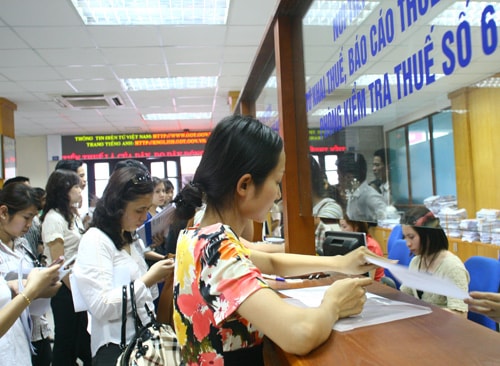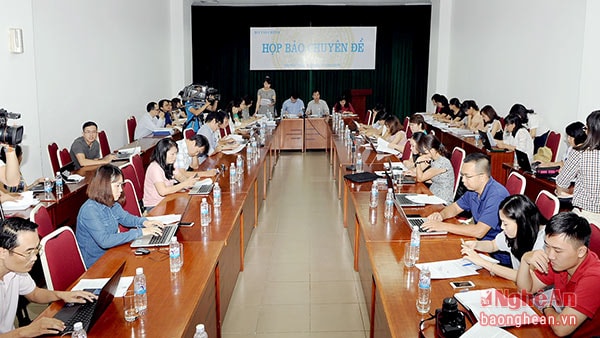New points of the Law on import and export tax
(Baonghean.vn) - On October 5, the Ministry of Finance held a press conference to introduce the basic contents and new points of the Law on Import and Export Tax (XNK). Along with that, the contents of the Decree promulgating the preferential import tax schedule, the list of goods and absolute tax rates, mixed tax, import tax outside the tariff quota and the Decree promulgating the special preferential import tax schedule to implement the Bilateral Trade Agreement were also introduced to a large number of reporters.
According to the Department of International Cooperation (Ministry of Finance), the Import-Export Tax Law No. 107/2016/QH13 dated April 6, 2016 was passed by the National Assembly and took effect from September 1, 2016. The Import-Export Tax Law consists of 5 chapters and 22 articles with many new breakthroughs in administrative reform, tax exemption, tax refund, anti-dumping tax, anti-subsidy tax, self-defense tax, etc.
 |
| Taxes are an important addition to the budget. Illustration photo |
The promulgation of this Tax Law has ensured the inheritance of the provisions of the Import-Export Tax Law No. 45/2005/QH11, and at the same time added new provisions to ensure the consistency and synchronization of the legal system with related documents such as the 2013 Constitution, Investment Law, Tax Administration Law, Customs Law... creating a legal environment and simple and convenient administrative procedures for the subjects of Law enforcement and contributing to the good implementation of tax management.
In addition, difficulties in the process of deployment and implementation have also been overcome, especially regarding regulations on: taxable subjects; tax rate framework; tax payment deadline and areas and sectors that need to be encouraged to develop on the basis of implementing preferential policies such as tax exemption and refund of export and import taxes.
To meet the requirements of socio-economic development in the new period, reform administrative procedures, reform the tax and customs systems according to the Tax and Customs System Reform Strategies for the period 2011-2020 in accordance with international commitments in the process of international integration. During that process, Vietnam has been proactive in negotiating and signing 11 bilateral and multilateral free trade agreements, of which 10 have come into effect.
To implement the commitments on import tax, the Ministry of Finance has presided over the development and submission to the Government for promulgation of Vietnam's special preferential import tax schedule to implement the Free Trade Agreements for the period 2016 - 2018/2019 with the principle of inheriting current regulations, not changing the preferential conditions, specific preferential tax rates, adjusting the name and description of goods to be consistent with the List of Vietnam's export and import goods to ensure the consistency of the legal system, in accordance with the Law on Import and Export Tax 2016, creating favorable conditions for businesses in the implementation process.
 |
| Ministry of Finance meeting on Import and Export Tax Law. |
At the press conference, representatives of the Ministry of Finance answered questions related to anti-dumping subsidy tax, Vietnam's export products affected by the Eurasian Economic Union Agreement; issues on trade defense, as well as impacts on the proportion of state budget revenue from import-export tax when implementing FTA agreements.
Obviously, with the increasingly deep scope of international integration commitments, the process of reducing the proportion of revenue from import and export taxes is inevitable and has been taking place since Vietnam joined the WTO. Before Vietnam joined the WTO, the simple average import and export tax was 18%, but through the process of implementing WTO commitments, the simple average tax is about 10%.
However, according to the assessment of the impact of FTAs, the absolute revenue proportion from import-export taxes will not decrease but will tend to increase, thereby creating a suitable policy space roadmap to ensure a balanced proportion in the state budget revenue in the coming time./.
Red River
| RELATED NEWS |
|---|
